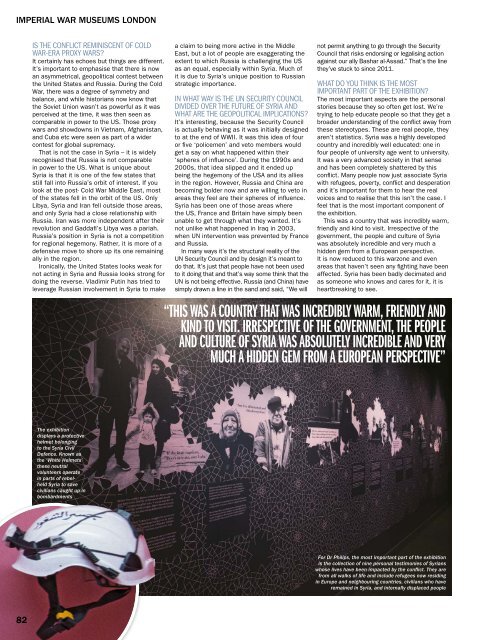You also want an ePaper? Increase the reach of your titles
YUMPU automatically turns print PDFs into web optimized ePapers that Google loves.
IMPERIAL WAR MUSEUMS LONDON<br />
IS THE CONFLICT REMINISCENT OF COLD<br />
WAR-ERA PROXY WARS?<br />
It certainly has echoes but things are different.<br />
It’s important to emphasise that there is now<br />
an asymmetrical, geopolitical contest between<br />
the United States and Russia. During the Cold<br />
<strong>War</strong>, there was a degree <strong>of</strong> symmetry and<br />
balance, and while historians now know that<br />
the Soviet Union wasn’t as powerful as it was<br />
perceived at the time, it was then seen as<br />
comparable in power to the US. Those proxy<br />
wars and showdowns in Vietnam, Afghanistan,<br />
and Cuba etc were seen as part <strong>of</strong> a wider<br />
contest for global supremacy.<br />
That is not the case in Syria – it is widely<br />
recognised that Russia is not comparable<br />
in power to the US. What is unique about<br />
Syria is that it is one <strong>of</strong> the few states that<br />
still fall into Russia’s orbit <strong>of</strong> interest. If you<br />
look at the post- Cold <strong>War</strong> Middle East, most<br />
<strong>of</strong> the states fell in the orbit <strong>of</strong> the US. Only<br />
Libya, Syria and Iran fell outside those areas,<br />
and only Syria had a close relationship with<br />
Russia. Iran was more independent after their<br />
revolution and Gaddafi’s Libya was a pariah.<br />
Russia’s position in Syria is not a competition<br />
for regional hegemony. Rather, it is more <strong>of</strong> a<br />
defensive move to shore up its one remaining<br />
ally in the region.<br />
Ironically, the United States looks weak for<br />
not acting in Syria and Russia looks strong for<br />
doing the reverse. Vladimir Putin has tried to<br />
leverage Russian involvement in Syria to make<br />
a claim to being more active in the Middle<br />
East, but a lot <strong>of</strong> people are exaggerating the<br />
extent to which Russia is challenging the US<br />
as an equal, especially within Syria. Much <strong>of</strong><br />
it is due to Syria’s unique position to Russian<br />
strategic importance.<br />
IN WHAT WAY IS THE UN SECURITY COUNCIL<br />
DIVIDED OVER THE FUTURE OF SYRIA AND<br />
WHAT ARE THE GEOPOLITICAL IMPLICATIONS?<br />
It’s interesting, because the Security Council<br />
is actually behaving as it was initially designed<br />
to at the end <strong>of</strong> WWII. It was this idea <strong>of</strong> four<br />
or five ‘policemen’ and veto members would<br />
get a say on what happened within their<br />
‘spheres <strong>of</strong> influence’. During the 1990s and<br />
2000s, that idea slipped and it ended up<br />
being the hegemony <strong>of</strong> the USA and its allies<br />
in the region. However, Russia and China are<br />
becoming bolder now and are willing to veto in<br />
areas they feel are their spheres <strong>of</strong> influence.<br />
Syria has been one <strong>of</strong> those areas where<br />
the US, France and Britain have simply been<br />
unable to get through what they wanted. It’s<br />
not unlike what happened in Iraq in 2003,<br />
when UN intervention was prevented by France<br />
and Russia.<br />
In many ways it’s the structural reality <strong>of</strong> the<br />
UN Security Council and by design it’s meant to<br />
do that. It’s just that people have not been used<br />
to it doing that and that’s way some think that the<br />
UN is not being effective. Russia (and China) have<br />
simply drawn a line in the sand and said, “We will<br />
not permit anything to go through the Security<br />
Council that risks endorsing or legalising action<br />
against our ally Bashar al-Assad.” That’s the line<br />
they’ve stuck to since 2011.<br />
WHAT DO YOU THINK IS THE MOST<br />
IMPORTANT PART OF THE EXHIBITION?<br />
The most important aspects are the personal<br />
stories because they so <strong>of</strong>ten get lost. We’re<br />
trying to help educate people so that they get a<br />
broader understanding <strong>of</strong> the conflict away from<br />
these stereotypes. These are real people, they<br />
aren’t statistics. Syria was a highly developed<br />
country and incredibly well educated: one in<br />
four people <strong>of</strong> university age went to university.<br />
It was a very advanced society in that sense<br />
and has been completely shattered by this<br />
conflict. Many people now just associate Syria<br />
with refugees, poverty, conflict and desperation<br />
and it’s important for them to hear the real<br />
voices and to realise that this isn’t the case. I<br />
feel that is the most important component <strong>of</strong><br />
the exhibition.<br />
This was a country that was incredibly warm,<br />
friendly and kind to visit. Irrespective <strong>of</strong> the<br />
government, the people and culture <strong>of</strong> Syria<br />
was absolutely incredible and very much a<br />
hidden gem from a European perspective.<br />
It is now reduced to this warzone and even<br />
areas that haven’t seen any fighting have been<br />
affected. Syria has been badly decimated and<br />
as someone who knows and cares for it, it is<br />
heartbreaking to see.<br />
“THIS WAS A COUNTRY THAT WAS INCREDIBLY WARM, FRIENDLY AND<br />
KIND TO VISIT. IRRESPECTIVE OF THE GOVERNMENT, THE PEOPLE<br />
AND CULTURE OF SYRIA WAS ABSOLUTELY INCREDIBLE AND VERY<br />
MUCH A HIDDEN GEM FROM A EUROPEAN PERSPECTIVE”<br />
The exhibition<br />
displays a protective<br />
helmet belonging<br />
to the Syria Civil<br />
Defence. Known as<br />
the ‘White Helmets’<br />
these neutral<br />
volunteers operate<br />
in parts <strong>of</strong> rebelheld<br />
Syria to save<br />
civilians caught up in<br />
bombardments<br />
For Dr Philips, the most important part <strong>of</strong> the exhibition<br />
is the collection <strong>of</strong> nine personal testimonies <strong>of</strong> Syrians<br />
whose lives have been impacted by the conflict. They are<br />
from all walks <strong>of</strong> life and include refugees now residing<br />
in Europe and neighbouring countries, civilians who have<br />
remained in Syria, and internally displaced people<br />
82


















